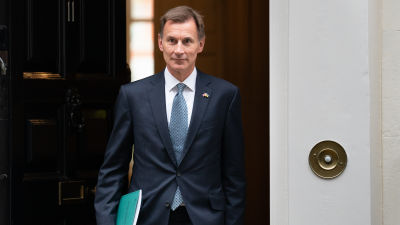Government borrowing soars to record £22 billion in November amid 'twin global emergencies'

Due to higher interest costs and cost-of-living payments to households, government borrowing surged to £22 billion last month.
According to the Office for National Statistics (ONS), state borrowing leapt £13.9 billion compared with the same month last year.
Figures showed the reading represented the highest monthly figure for November borrowing since records began in 1993.
The value was also ahead of forecasts by economists, who had predicted a figure of £21 billion for the month according to a consensus from Pantheon Macroeconomics.
Chancellor Jeremy Hunt said: "Faced with the twin global emergencies of a pandemic and Putin’s war in Ukraine, we have taken significant action to support millions of businesses and families here in the UK.
"We have a clear plan to help halve inflation next year, but that requires some tough decisions to put our public finances back on a sustainable footing."
The ONS said total public sector spending struck £98.9 billion for the month while day-to-day central government expenditure increased by £13.5 billion to £82 billion for November.
Included within this was a 50% hike in interest payments to £7.3 billion, driven by debt interest payments linked to Retail Prices Index (RPI) inflation, it added.
Meanwhile, the government also witnessed a £3.3 billion increase in social assistance costs to £13.2 billion, driven by an increase in cost-of-living payments.
Public sector receipts - largely tax revenues for the government - hit £76.9 billion for the month.
The ONS also revealed that public sector net debt grew by £125.9 billion to £2,477.5 billion compared to November last year.
Want a quick and expert briefing on the biggest news stories? Listen to our latest podcasts to find out What You Need To Know.